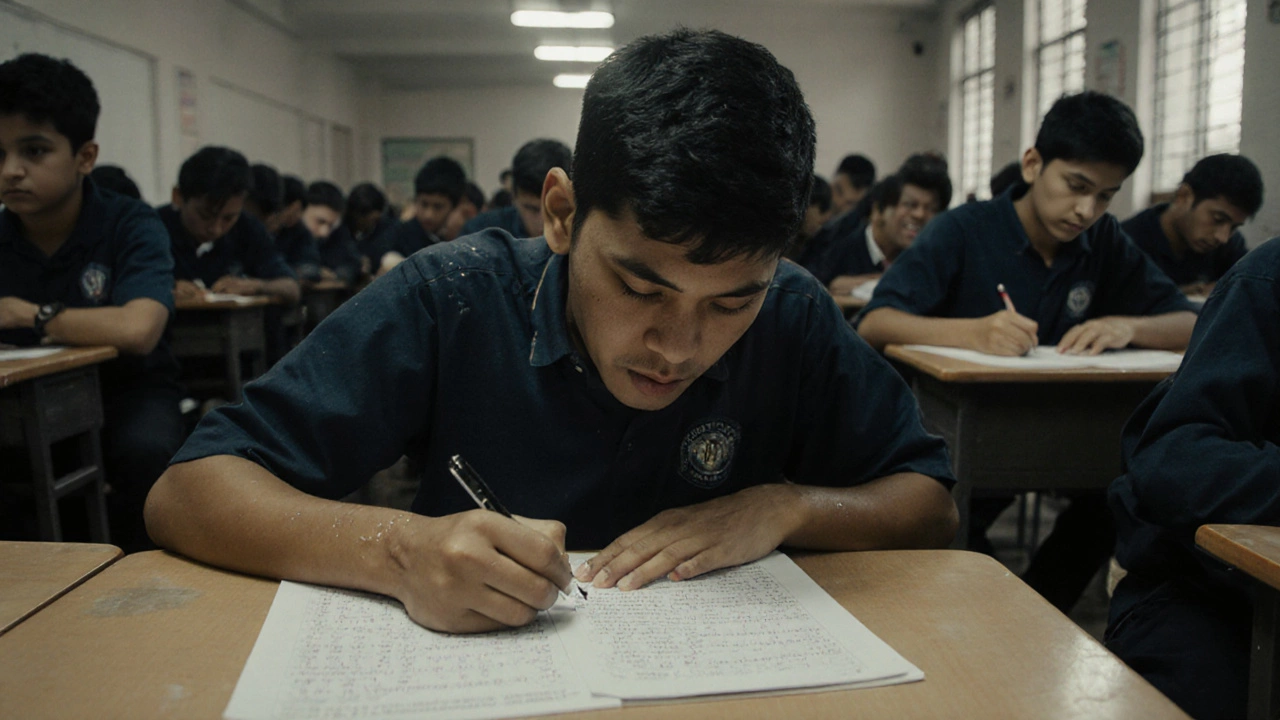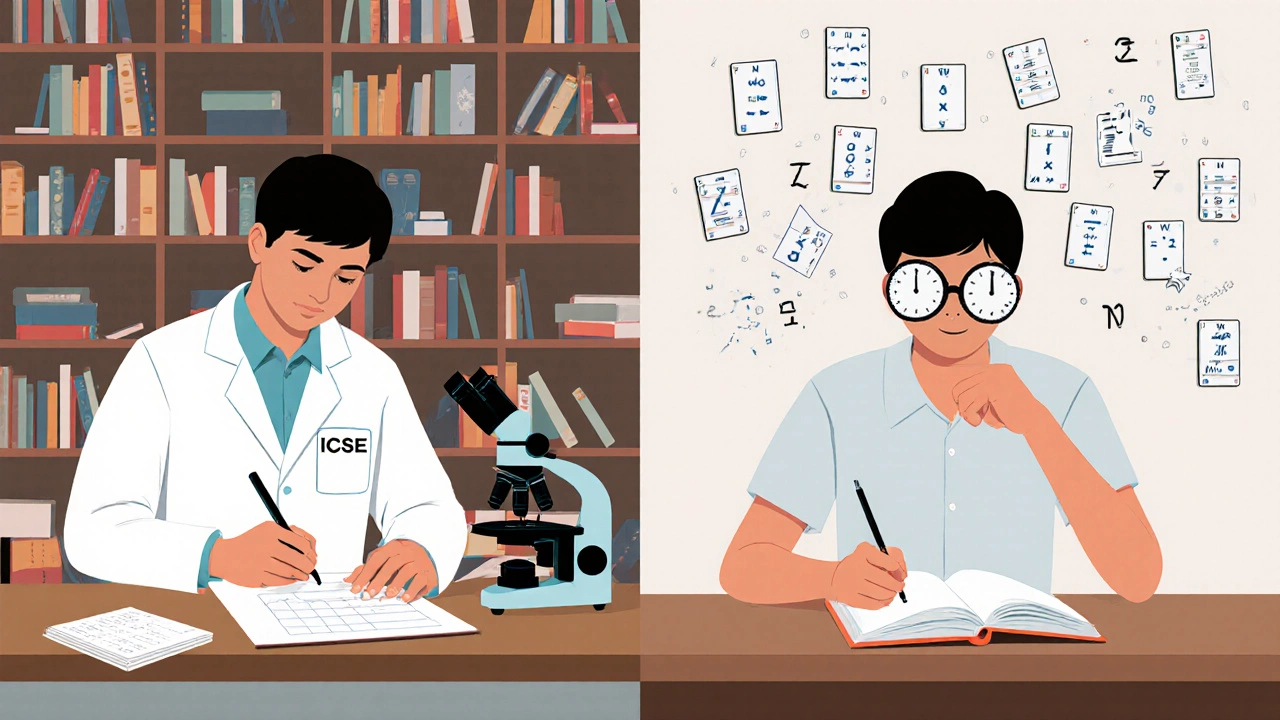School Board Suitability Calculator
How does your child learn best?
Why this board?
When parents and students in India talk about the hardest school boards, two names always come up: ICSE and CBSE. But calling one ‘tougher’ than the other isn’t just about syllabus length-it’s about how exams are designed, what skills they test, and what kind of student thrives under each system. If you’re trying to decide which board suits your child-or just wondering why some students struggle more than others-here’s what actually makes these two boards stand out.
ICSE: Depth Over Breadth
The Council for the Indian School Certificate Examinations (CISCE), which runs the ICSE board, is known for its detailed, literature-heavy curriculum. Students in Class 10 take exams in seven to ten subjects, including English, a second language, Mathematics, Science (split into Physics, Chemistry, and Biology), History, Geography, and Computer Applications. That’s more subjects than CBSE, and each one demands deep understanding, not just memorization.
For example, in English Literature, ICSE students read full novels like The Merchant of Venice or Oliver Twist, then write analytical essays on themes, character development, and author intent. There’s no multiple-choice section. No shortcuts. You have to explain, justify, and connect ideas. In Science, questions often ask you to derive formulas from first principles or explain real-world applications, not just recall facts.
Practical exams are also stricter. In Biology, students must label diagrams with exact terminology. In Physics, lab reports are graded on precision-wrong units or missing steps can cost marks. The board doesn’t give grace marks for neat handwriting or partial answers. If your reasoning is flawed, you lose points.
CBSE: Speed, Structure, and Standardization
The Central Board of Secondary Education (CBSE) is the largest board in India, with over 20,000 affiliated schools. It’s designed for scalability. The syllabus is streamlined, with a clear focus on core subjects: English, Mathematics, Science, Social Science, and a second language. Fewer subjects mean less pressure to juggle topics-but the exams are fast-paced.
CBSE papers are structured to be answered quickly. Most questions are direct: definitions, formulas, diagrams, short answers. There’s a heavy emphasis on the NCERT textbooks. If you’ve memorized every line of the Class 12 Physics NCERT, you can score well-even if you don’t fully understand the underlying physics.
But here’s the catch: CBSE exams are timed tightly. You have three hours to answer 35-40 questions across five subjects. That’s about four minutes per question. If you get stuck on one, you risk running out of time. Students who think slowly or struggle with time management often underperform, even if they know the material.
Also, CBSE’s pattern is predictable. Questions repeat across years. That’s why coaching centers thrive-they teach students to recognize patterns, not think critically. But if you’re asked something outside the usual format, many students freeze. The system rewards consistency over creativity.
Why ICSE Feels Harder to Parents
Many parents think ICSE is tougher because their kids spend more hours studying. That’s true. A typical ICSE student spends 6-7 hours daily on academics, including extra reading, lab work, and project submissions. CBSE students might spend 4-5 hours, focusing on revision and practice papers.
But it’s not just about hours. ICSE tests comprehension, expression, and application. CBSE tests recall and speed. One isn’t harder-it’s just different. ICSE doesn’t care how fast you write. It cares if you know why the water cycle matters. CBSE cares if you can write the formula for photosynthesis in under 30 seconds.
There’s also the grading difference. ICSE has a higher weightage for internal assessments-projects, presentations, fieldwork. If your child is strong in theory but weak in expression, ICSE will show it. CBSE’s internal assessment is minimal. Your final grade depends almost entirely on the written exam.

Why CBSE Feels Harder to Students
For students who think deeply but write slowly, CBSE is brutal. The exam format doesn’t give room to breathe. You’re expected to answer 10-mark questions in 15 minutes. If you’re the kind of student who likes to reflect before writing, you’ll feel rushed. Many ICSE students report feeling less pressure during exams because they have more time per question.
Also, CBSE’s syllabus is narrower but denser. You can’t skip a chapter in Chemistry and still score 80%. Every unit-from Chemical Bonding to Electrochemistry-is heavily weighted. One weak area can tank your overall score. ICSE lets you compensate. If you’re weak in History, you can make up for it with strong performance in Literature or Geography.
Who Succeeds Where?
ICSE suits students who:
- Love reading and writing
- Think critically and enjoy open-ended questions
- Are good at managing long-term projects
- Plan to study abroad (many international universities prefer ICSE for its depth)
CBSE suits students who:
- Learn quickly and retain facts well
- Perform under time pressure
- Plan to take competitive exams like JEE or NEET (CBSE syllabus aligns directly with these)
- Prefer structured, predictable patterns
There’s no universal ‘toughest’ board. It depends on your child’s learning style. A student who thrives on creativity and expression might find CBSE stressful. A student who excels in speed and accuracy might find ICSE overwhelming.

What About Class 12?
The difficulty doesn’t change much after Class 10. ICSE Class 12 still requires essays, research-based projects, and detailed answers. CBSE Class 12 is even more exam-focused, especially for JEE and NEET aspirants. The board even releases sample papers that mirror the pattern of these entrance tests.
That’s why so many ICSE students switch to CBSE after Class 10 if they’re aiming for engineering or medicine. It’s not that CBSE is easier-it’s that it’s more aligned with the next step. ICSE doesn’t change. It just doesn’t tailor itself to competitive exams.
The Real Takeaway
Neither board is objectively harder. ICSE demands more thinking. CBSE demands more speed. One tests depth, the other tests efficiency. The toughest board isn’t the one with the longest syllabus-it’s the one that doesn’t match your child’s strengths.
If your child reads novels for fun and writes essays in their free time, ICSE will feel like a natural fit. If they solve math problems in their head during bus rides and thrive on timed quizzes, CBSE might be better.
Don’t choose based on what’s ‘tougher.’ Choose based on what fits.
Is ICSE harder than CBSE for competitive exams like JEE and NEET?
ICSE covers more topics in greater depth, but its syllabus doesn’t align directly with JEE or NEET patterns. CBSE follows NCERT textbooks exactly, which are the foundation for these exams. Most coaching institutes design their curriculum around CBSE content, making it easier for CBSE students to transition. ICSE students can still crack JEE and NEET, but they often need extra coaching to fill gaps in topics like Physics derivations or Chemistry reactions that are emphasized in CBSE.
Do universities abroad prefer ICSE over CBSE?
Yes, many international universities, especially in the UK, Canada, and Australia, view ICSE as more rigorous because of its emphasis on critical thinking, writing, and project-based learning. ICSE students often submit stronger personal statements and portfolios. CBSE students aren’t at a disadvantage, but they may need to work harder to demonstrate depth beyond exam scores-through extracurriculars, research, or internships.
Can a student switch from ICSE to CBSE after Class 10?
Yes, switching is common, especially for students aiming for engineering or medical careers. The transition is smoother in Class 11 because both boards cover similar core topics in Physics, Chemistry, and Math. The main challenge is adapting to CBSE’s faster exam pace and reliance on NCERT. Students usually need 2-3 months of focused coaching to adjust to the new pattern.
Is ICSE more expensive than CBSE?
Yes, ICSE schools tend to have higher fees. This is because they invest more in resources-libraries, labs, project materials, and smaller class sizes. CBSE schools, especially in government and low-cost private systems, operate with tighter budgets. The cost difference reflects the board’s approach: ICSE prioritizes holistic development, CBSE prioritizes accessibility and scalability.
Does ICSE help with language skills more than CBSE?
Definitely. ICSE places a strong emphasis on English as a first language, requiring students to study grammar, literature, and composition in depth. Many ICSE students develop superior writing and communication skills compared to CBSE peers. CBSE focuses on functional English-reading, writing, and comprehension-but doesn’t require the same level of literary analysis. For students aiming for careers in law, media, or international business, ICSE gives a clear edge.

